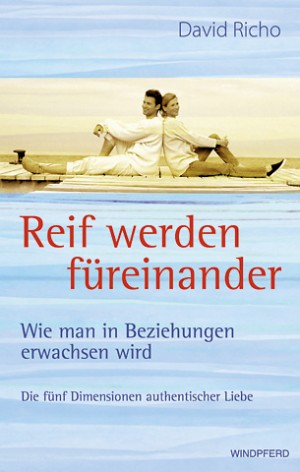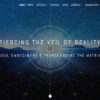 Der Psychotherapeut David Richo hat ein ungemein hilfreiches Handbuch geschrieben für alle, die echte Intimität oder tragfähige Beziehungen zu einem anderen Menschen suchen, ob sie nun vor einer Beziehung stehen, mitten darin oder eine problematische Beziehung hinter sich haben und sich fragen, wie es das nächste Mal besser laufen könnte. Mit „Reif werden füreinander“ ist David Richo ein Buch gelungen, das man Frischverliebten ebenso wie Singles, Paaren in einer Krise und Beziehungsgeschädigten, der besten Freundin oder dem besten Freund in die Hand drücken (oder von ihnen geschenkt bekommen) möchte. Denn es könnte einem jeden von uns helfen, in unseren zwischenmenschlichen Beziehungen eine erfülltere Form der Liebe zu verwirklichen, in der wir uns gegenseitig dabei unterstützen, unsere tiefsten Bedürfnisse, Werte und Wünsche zu realisieren.
Der Psychotherapeut David Richo hat ein ungemein hilfreiches Handbuch geschrieben für alle, die echte Intimität oder tragfähige Beziehungen zu einem anderen Menschen suchen, ob sie nun vor einer Beziehung stehen, mitten darin oder eine problematische Beziehung hinter sich haben und sich fragen, wie es das nächste Mal besser laufen könnte. Mit „Reif werden füreinander“ ist David Richo ein Buch gelungen, das man Frischverliebten ebenso wie Singles, Paaren in einer Krise und Beziehungsgeschädigten, der besten Freundin oder dem besten Freund in die Hand drücken (oder von ihnen geschenkt bekommen) möchte. Denn es könnte einem jeden von uns helfen, in unseren zwischenmenschlichen Beziehungen eine erfülltere Form der Liebe zu verwirklichen, in der wir uns gegenseitig dabei unterstützen, unsere tiefsten Bedürfnisse, Werte und Wünsche zu realisieren.
David Richo gehört in den USA zu den namhaften Psychotherapeuten und Trainern. Er lehrt unter anderem regelmäßig am Esalen Institute, wo bereits Moshe Feldenkrais, Ida Rolf und Fritz Perls ihr Wissen weitergaben, und am renommierten New York Open Center.
David Richo, dessen erstes auf Deutsch erschienenes Buch „Fünf Dinge die wir nicht ändern können“ zu den Bestsellern moderner Lebenshilfe zählt, schrieb mit „Reif werden füreinander“ ein Buch, das Therapeuten in den USA heute ganz vorne auf ihre Empfehlungsliste setzen.
David Richo: „Jeder von uns erfährt die Liebe auf seine eigene Weise, doch für die meisten von uns hat sie vor allem Fünf Aspekte: Aufmerksamkeit, Akzeptanz, Wertschätzung, Zuneigung und die Freiheit, in Übereinstimmung mit tiefsten Wünschen und Bedürfnissen zu leben.“
Im Verlauf des Buches stellt der Therapeut und Autor seinen Lesern die folgenden zentralen Fragen und er unterstützt sie darin, Antworten auf der Basis ihres individuellen Lebensweges zu finden:
- Was ist nötig, damit ich das Glück finde, das ich immer gesucht habe?
- Werde ich mich geliebt fühlen, wie ich immer geliebt werden wollte?
- Was ist nötig, damit ich die Vergangenheit loslassen kann?
- Werde ich lernen, meine eigenen Grenzen zu wahren? Werde ich darauf bestehen können, dass andere sie respektieren, und werde ich die Grenzen anderer respektieren?
- Werde ich jemals das Bedürfnis, die Dinge zu kontrollieren, loslassen können?
- Werde ich es jemals wagen, aus ganzem Herzen zu lieben?
Versöhnung mit der Vergangenheit
Autor: David Richo
Übersetzung: Stephan Schuhmacher
Taschenbuch
Der Psychotherapeut David Richo zeigt auf, wie wir die Vergangenheit in unseren gegenwärtigen Beziehungen wiederholen – und wie wir uns von destruktiven Mustern befreien können.Wenn alte Wunden schmerzen, hilft nur Bewusstwerden. Bewusst können wir unser emotionales Gepäck erkennen und Schritte unternehmen, es zu integrieren und innerlich zu wachsen.Ein erhellendes Buch über unsere Neigung, starke Gefühle, Bedürfnisse und Erwartungen aus der Kindheit oder aus früheren Beziehungen zu übernehmen und sie auf die Menschen zu übertragen, mit denen wir heute zu tun haben.Wir erkennen, wie Wunden aus der Kindheit in erwachsenen Beziehungen zutage treten – und weshalb dies ein Geschenk ist. Wir lernen emotionale Risse zu identifizieren und zu heilen. Wir erkennen Abneigungen gegen Personen als Hinweis, unsere emotionalen Hausaufgaben zu erledigen. – Und nicht zuletzt nutzen wir Achtsamkeit, um authentische Intimität zu leben.
How to be an Adult in Relationships
“Mindfulness is being an adult. It is unattainable for someone who lacks inner cohesion, personal continuity, and integration. Being a fair witness requires a healthy ego, because distance and objectivity are unavailable to someone with poor boundaries, no tolerance of ambiguity, and no sense of a personal center.
Mindfulness can be either consciousness without content (pure awareness with no attention to any particular issue or feeling) or consciousness with content (attention without ego intrusions, called mindfulness of the mind).
Mindfulness is a courageous venture because it is trusting that we have it in us to hold and tolerate our feelings, to grant them hospitality no matter how frightening they seem, to live with them in equipoise. We then discover a strength within us that is equivalent of self-discovery. From that self-esteem comes effective relating with others. Because mindfulness leads us to let go of ego by letting go of fear and grasping, it is an apt tool for relating. It makes us present to others, without the buffers of the neurotic ego.
We simply stay with someone as he/she is, noticing not judging. We take what a partner does as information without having to sensor or blame. In doing this we put space around and event rather than crowding it with our own beliefs, fears, and judgments. Such mindful presence dress us from constricting identification with another’s actions. A healthy relationship is one in which there are more and more such spacious moments.
Mindfulness is not meant to helps us escape reality but to see it clearly, without the blinding overlays of the ego.
Mindfulness is inherent in human nature. We were built to pay attention to reality. Indeed, paying attention is a survival technique. Over the years, though, we learn to escape reality and take refuge in illusory sanctuaries built by and ego frightened of reality. We notice that it is easier to believe what will make us feel better, and we feel entitled to expect that others will be what we need them to be. These are man-made chains that look like links to happiness. But once we commit ourselves to experience divested of ego wishes and attachments, we begin to act straightforwardly, becoming truthful with one another.
The healthy ego is the part of us that can observe self, situations, and persons, assess them; and respond in such a way as to move towards our goals. It assists us in relationships by making us responsible and sensible in our choices and commitments.
The neurotic ego, on the other hand, is the part of us that is compulsively driven or stymied by fear or desire, feeding arrogance, entitlement, attachment, and the need to control other people. Sometimes it is self-negating and makes us feel we are victims of others. This neurotic ego is the one we are meant to dismantle as our spiritual task in life.
The neurotic ego wants to follow the path of least resistance. The spiritual Self wants to reveal new paths.
Childhood forces influence present choices, for the past is on a continuum with the present. Early business that is still unfinished does not have to be a sign of immaturity; rather, it can signal continuity. Recurrence of childhood themes in adult relationships gives our life depth in that we are not superficially passing over life events but inhabiting them fully as they evolve. Our past becomes a problem only when it leads to a compulsion to repeat our losses or smuggles unconscious determinants into our decisions. Our work, then, is not to abolish our connection to the past but to take it into account without being at tis mercy. The question is how much the past interferes with our chances at healthy relating and living in accord with our deepest needs, values, and wishes.
Every person needs the nourishment of food throughout life. Likewise, a psychologically healthy person needs the sustenance of the five A’s – attention, acceptance, appreciation, affection, and allowing. It is true that unmet needs for the five A’s in childhood cannot be made up for later in life, in the sense that they cannot be fulfilled so absolutely, so immediately, or so unfailingly. That absolute, immediate fulfillment of needs by one person is appropriate only to infants.
But needs can be fulfilled, in short or longterm installments, throughout life. The problem is not that we seek gratification but that we seek too much of it all at once. What we did not receive enough of before, we cannot receive enough of now; what we did receive enough of before, we can receive enough of now.
We do not outgrow our early needs. Rather they become less overwhelming, and we find less primitive ways to fulfill them. For example, an infant may need to be cradled and carried, while an adult may be satisfied with a supportive remark and a kindly glance. Sometimes a lifelong need can be fulfilled by just such little moments of mindful love.”
– David Richo, How to be an Adult in Relationships – www.davericho.com/books/




